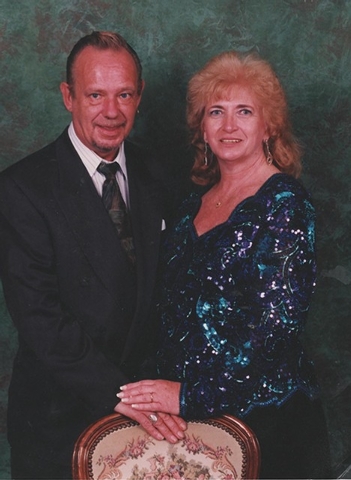Overcoming denial is important part of grieving process


Grieving is an emotional process that one must endure after losing a loved one. Some people avoid it by going into denial. Joanne Dahl of Spring Valley was one of those people.
For more than a decade, Dahl knew her husband’s smoking habit was killing him. His chronic obstructive pulmonary disease forced him into early retirement. It also required her to quit her job to be his full-time caregiver.
“I (told) him to quit smoking cigarettes, but he wouldn’t listen,” she said. “It broke my heart every time he’d light up. … Even though you know the time is coming, you still kind of lie to yourself and say, ‘He’ll be fine.’ ”
In 2003, Ronald Dahl, 63, went into hospice care. Although doctors told her the end was near and Ronald had less than a 5 percent chance of recovering, Joanne refused to believe them. Instead, she told them they had it wrong and he’d be fine.
When Ronald died, she was holding his hand. She said his death shattered her world.
“I was so in denial,” she said. “I just sat in a chair for the next four or five years. People would call, try to engage me in conversation, but it was like I wasn’t there. I mean, I was at the point where I barely bathed, it was disgusting. … The personality you see now, I was totally different in those days.”
Finally, her younger sister, June Shepard, flew out from Long Island, N.Y., and cleared the house of Ronald’s possessions. She had Joanne admitted to a mental hospital for three weeks. Upon her release, Joanne reconnected with a knitting group at the West Flamingo Senior Center, 6255 W. Flamingo Road. She said it had been a weekly outlet for those years she was housebound and caring for Ronald, and now, it got her out of the house again.
The center also has a bereavement group, led by facilitator Lisa Alala. It meets from 1:30 to 2:45 p.m. the second Monday of each month. For more information, call 702-455-7742.
Joanne began going and has never really stopped. She now helps others who come to the group by listening and commiserating.
“She uses me as the example of what not to do,” she joked of Alala. “She’s like, ‘Don’t be like Joanne.’ But she understands. She’s a wonderful person for helping people heal.”
The group urges attendees to find new hobbies, ones that do not revisit activities shared with their deceased loved one. Joanne joined a book club.
Jason Holland, a grief specialist with UNLV’s Department of Psychology, said that the predictable responses to shocking news — denial, anger, bargaining, depression and acceptance — do not always apply to a person who has lost a loved one.
“In a study by George Bonanno and his colleagues in 2002, they followed older adults before the loss of their spouse and six, 18 and 48 months afterward. These researchers identified five distinct ‘trajectories’ through the grieving process,” Holland said. “Although people typically think of grief as initially causing significant distress that eventually dissipates over time, in this study only 11 percent of the participants showed this type of a pattern … Roughly 46 percent of participants exhibited a ‘resilient’ trajectory, highlighting the human capacity to bounce back and reinvest in life.”
A subgroup of about 15 percent displayed a chronic grief trajectory, characterized by low levels of depression before the loss occurred, with depression elevated after the death and remaining elevated. Mental health professionals refer to this as “prolonged grief disorder,” and the possibility of therapy can be addressed.
The way someone subjectively makes sense of the loss, impacts their response. Persistent perceptions that the loss “makes no sense” or violates fundamental beliefs about the world may indicate some complications in the grieving process, Holland said.
At Nathan Adelson Hospice, people coping with loss is a constant factor. The hospice has offered support groups for survivors since its early days. Groups meet at both of its campuses, including a special group for parents who have lost adult children. For more information, visit nah.org or call 702-733-0320.
The Rev. Matt Metevelis oversees the program. The groups see from four to 21 attendees. Some people handle grief better than others, he said, attending only a few sessions before deciding they no longer need to go. Others, not so much.
“Some people are here for years,” Metevelis said. “We don’t chase anyone out. … Grief is a journey we go on.”
It’s one thing, he said, to have a belief that one day, the survivor will join their loved one in the hereafter but another one to have a debilitating reaction to the loss, no matter how secure one’s faith.
A lot of the program is about expressing oneself and getting feelings out. There is no judgment. Sometimes, exercises help those handle their grief. The group might be led on a meditation about letting go, asked to write a letter to their loved one or do a word association exercise.
“We live in a society where everything is malleable, deemed fixable,” Metevelis said. “But when you lose a person, a spouse, a parent, or — God forbid — a child, they were so much a part of you, there’s no getting over it easily. It’s a profound change in our lives.”
How does the grief of losing a loved one in an unexpected way, such as a fatal car accident, differ psychologically from losing someone whose death was expected?
“Although resiliency has been shown to be quite common across different types of losses, studies have found that loss by violent means, such as homicide, suicide or fatal accident, are on average associated with more severe levels of psychiatric symptoms,” Holland said. “Ted Rynearson discusses the ‘three V’s’ — violence, violation and volition — that may help to explain the increased distress following these events.”
A violent death may be accompanied by troubling images such as disfigurement of the body and other difficult memories — the smell of gun powder, loud sudden noises — which impact one’s ability to come to terms with the loss.
“These deaths may also be viewed as a violation because the death involves a transgressive act that disregards the victim and/or challenges basic assumptions about the safety and stability of the world,” Holland said. “Finally, the death is often perceived as an act of volition, meaning it is freely chosen by the perpetrator, in the case of murder, the victim, in the case of suicide, or someone else who is viewed as being responsible for the death, a drunk driver in the case of an automobile accident. These three factors may be crucial because they challenge assumptive worldviews about justice of the world, benevolence of other people, and the predictability of everyday life.”
“You will always carry that pain,” Metevelis said. “By keeping that pain, you honor the person you love.”
Contact Summerlin Area View reporter Jan Hogan at jhogan@viewnews.com or 702-387-2949.
This is the second story in a three-part series on bereavement support groups and the grieving process. The final installment, which will focus on grieving the loss of a child and how children grieve the loss of loved ones, is scheduled to run in the Aug. 14 Views.


















